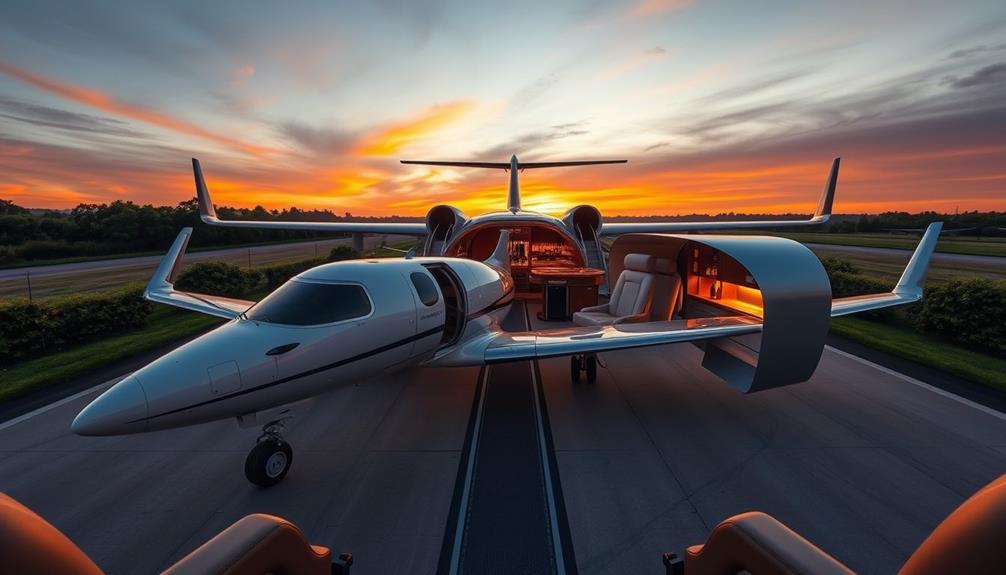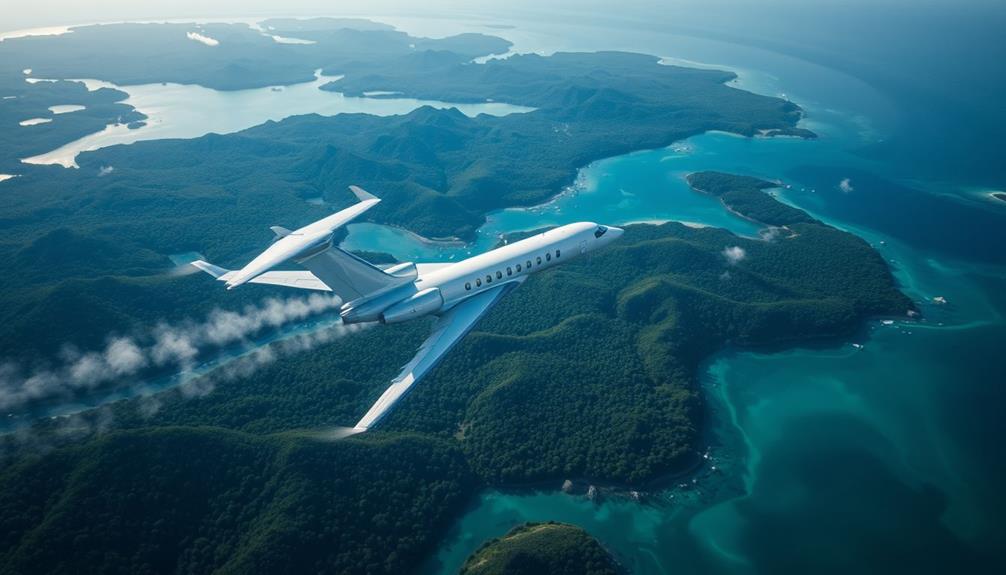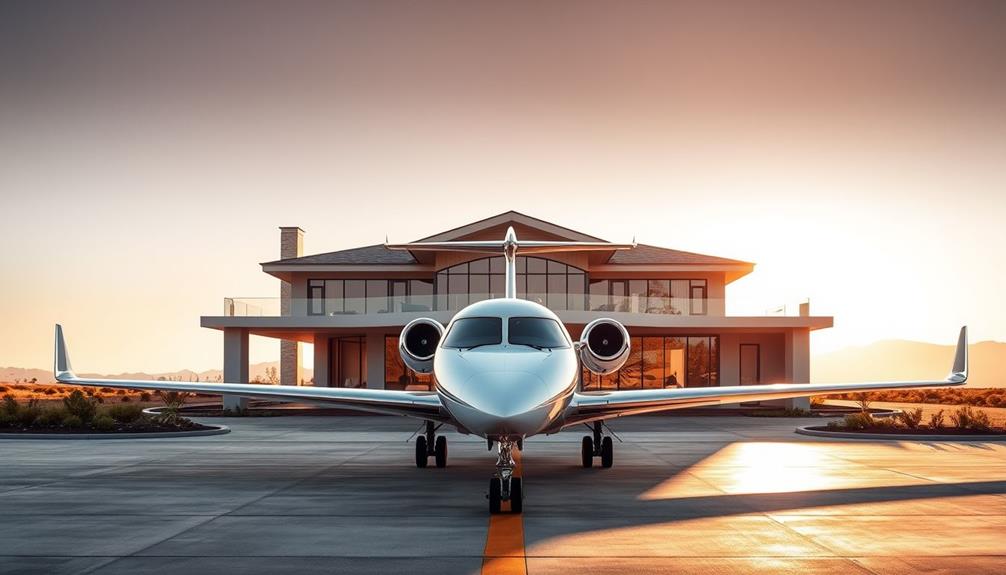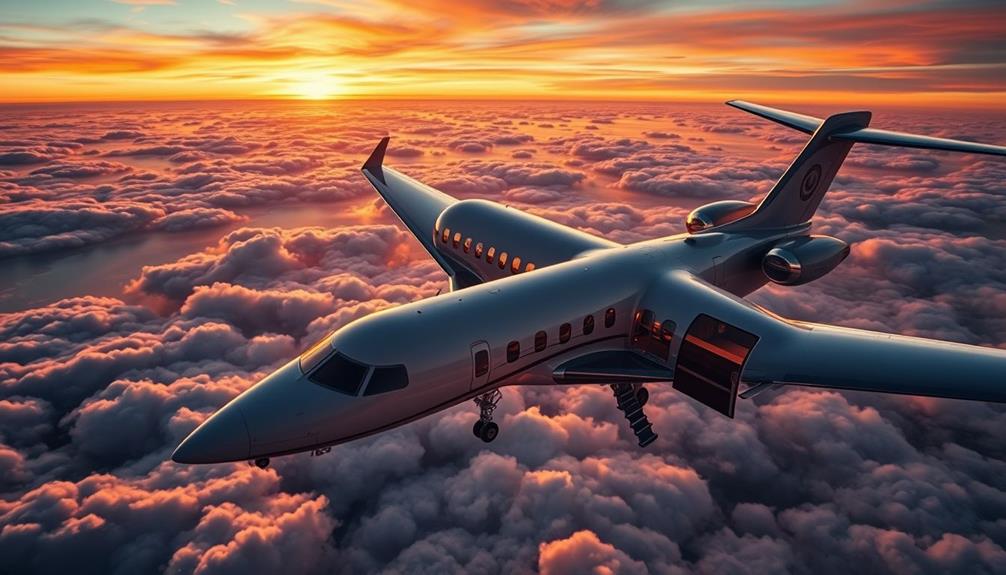If you want a private jet, expect to need a mind-boggling net worth starting at around $25 million. Depending on the aircraft type and how much you fly, that figure could soar to $60 million or even higher. The initial cost of owning a jet ranges from $3 million to over $90 million, plus you'll face annual expenses exceeding $500,000. Ultimately, an income of over $1 million a year is recommended for affordability. Considering all these financial factors, it's essential to understand what's involved in private jet ownership. Stick around, and you'll discover even more insights.
Key Takeaways
- A minimum net worth of $25 million is often required for private jet ownership.
- Frequent flyers typically need a net worth between $60 million and $70 million.
- Initial investments for private jets range from $300,000 to over $90 million.
- Average net worth for jet owners is between $60 million and $120 million.
- Annual income exceeding $1 million is recommended for affordability in private jet ownership.
The Rise of Private Jet Demand
Why has the demand for private jets skyrocketed in recent years? The private jet industry has witnessed an astonishing 50% increase in flights from 2019 to 2021. High net worth individuals, typically those with an annual income of at least $1 million and a minimum net worth of $25 million, are driving this trend.
As investors increasingly prioritize sustainability and responsible investing, many wealthy travelers prefer flying private to sidestep the hassles of commercial air travel, especially in a post-pandemic world where safety and personalized experiences have become paramount.
This surge in demand isn't just about the luxury of skipping long lines; it's also about the economic ripple effect. Private jets generate substantial business for hotels, rentals, fuel, and catering services.
As more individuals explore the idea of private air travel, options like jet suite services and charter flights have emerged, providing cost-effective alternatives. Fractional ownership is gaining traction, appealing to a younger demographic who want to experience the benefits of flying private without the hefty price tag of full ownership.
This dynamic shift signifies that the private jet market is evolving, catering to changing preferences and lifestyles.
Understanding Private Flight Costs

When considering private flight, it's essential to understand the cost breakdown between ownership and chartering.
You'll find that owning a jet involves hefty operational expenses, such as maintenance and crew salaries, while chartering offers a flexible, often more affordable alternative for occasional flyers.
Additionally, evaluating your overall investment goals can help you make informed decisions about the best option for your travel needs.
Let's explore how these costs stack up and help you determine the best option for your travel needs.
Ownership Expense Breakdown
Owning a private jet comes with a complex web of expenses that can quickly add up. The initial purchase price alone ranges from $3 million to over $90 million, depending on the size and capabilities of the aircraft. But that's just the beginning.
You'll face annual operating costs that can hit between $500,000 and $1 million. This includes routine maintenance, crew salaries, and hangar fees. Investing in luxury assets can also be complemented with strategies like a Gold IRA for financial stability, providing a hedge against economic fluctuations.
Fuel costs are a significant part of private jet ownership; you can expect to pay between $1,200 and $2,000 per hour of flight. When you calculate your flight hours, those costs can escalate rapidly. Additionally, insurance premiums typically range from $25,000 to $100,000 per year, depending on your jet's value and how often you fly.
Don't forget about maintenance and repairs. Even routine upkeep can be costly, with specific repairs, such as blown tire replacements, running from $2,000 to $3,000.
Understanding these expenses is essential if you're considering entering the world of private aviation. Be prepared to manage these ongoing costs to truly enjoy the benefits of private jet ownership.
Charter Vs. Ownership Costs
Maneuvering the financial landscape of private aviation can be intimidating, especially when weighing the costs of chartering against ownership. If you're someone who flies infrequently, charter flights might be your best bet. Rates typically range from $1,500 to $15,000 per hour, making it a much more cost-effective option than the hefty ownership costs that can exceed $1 million annually, not to mention the initial purchase price of private jets, which starts at around $2 million.
Additionally, just as diversifying a retirement portfolio through a Gold IRA can safeguard against market volatility, understanding the various private flight options can guarantee you make the right financial decision for your travel needs.
For those who find themselves flying regularly, ownership could make more sense economically. If you're flying over 240 flight hours a year, the math often tips in favor of ownership. Alternatively, fractional ownership models offer a sweet spot, allowing you to share a jet's costs while enjoying some ownership benefits. This option is generally recommended for individuals flying between 400 to 600 hours annually.
On-demand charters provide flexibility without long-term commitments, perfect for travelers with specific needs. Ultimately, understanding your flight frequency and preferences is key to deciding whether chartering or ownership will serve you best in the private aviation world.
Financial Commitments of Ownership

Taking on the ownership of a private jet involves significant financial commitments that extend far beyond the initial purchase price. While the upfront cost can range from $3 million to over $90 million, the ongoing operating costs are where most owners feel the financial strain.
You'll need to budget at least $500,000 to $1 million annually for maintenance, fuel, and hangar fees, which can add up to over $10,000 per month. Additionally, considering the importance of a solid financial strategy, many owners turn to investment options such as precious metal IRAs to help secure their wealth and manage their financial obligations.
Don't forget about annual insurance premiums, which typically range from $25,000 to $100,000 depending on your jet's size and value. You'll likely incur additional costs for crew salaries, often exceeding $100,000 yearly, alongside routine maintenance that can reach $200,000 annually.
Considering these expenses, it's clear that owning a private jet requires careful financial planning. Financing options may help, whether through outright purchases, share agreements, or leases, but you'll still need to prepare for the substantial ongoing costs.
Ultimately, understanding these financial commitments guarantees you're ready for the luxurious yet demanding responsibility of private jet ownership.
Net Worth Requirements for Private Jets

When considering private jet ownership, your net worth plays a vital role in determining what you can afford.
With average net worths for jet owners often ranging from $60 million to over $120 million, it's clear that financial resources are key to sustaining ownership costs.
Additionally, understanding the implications of maintaining a private jet, such as operational and maintenance expenses, is essential for potential buyers.
Yoga for back pain can provide insight into relaxation techniques that may ease the stress of ownership.
Understanding these requirements can help you weigh the benefits of ownership against chartering options.
Ownership Vs. Charter Costs
Owning a private jet can be an extravagant yet practical choice for frequent flyers, but the financial commitment is significant. To truly justify private jet ownership, you'll likely need a net worth of at least $25 million. For those who fly over 200 hours annually, this figure can soar to $60 million to $70 million, especially for larger jets.
Additionally, understanding the timing and types of flights you take can optimize your investment, as effective email marketing strategies can help in planning your travel more efficiently.
On the other hand, fractional ownership options present a less intimidating entry, requiring a minimum net worth of $5 million to $10 million and initial investments ranging from $300,000 to $1 million.
If you don't fly enough to warrant ownership, chartering a private jet might be your best bet. Charter costs vary widely, with prices from $1,500 to over $15,000 per flight hour, depending on the jet type and distance.
While owning a private jet can exceed $1 million in annual operational expenses, chartering offers flexibility without the hefty net worth requirements associated with ownership.
For occasional travelers, jet cards or private flight clubs can provide access to private jets without the long-term commitment, making flying private more accessible and manageable.
Average Net Worth Insights
Private jet ownership isn't just a luxury; it requires a significant financial foundation. To comfortably justify this expense, you should consider the average net worth of private jet owners, which typically ranges between $60 million and $70 million. If you're looking at midrange or super-midsize jets, you'll need around $120 million in net worth.
Here's a quick look at the financial requirements based on jet sizes:
| Jet Size | Minimum Net Worth | Annual Flight Requirement |
|---|---|---|
| Light Jets | $25 million | 240 hours |
| Midsize Jets | $60 million | 240 hours |
| Ultra-Long-Range Jets | $60 – $90 million | 240 hours |
High net worth individuals often have a minimum annual income exceeding $1 million to maintain financial viability. Larger jets come with increased operational costs, which further correlate with your wealth. Therefore, if you fly frequently—about 240 hours a year—owning a private jet becomes a viable alternative to chartering. It is crucial to assess your finances before making such a significant investment.
Financial Implications of Ownership
Investing in a private jet comes with substantial financial implications that extend beyond the initial purchase price. To truly enjoy private jet ownership, you should have a net worth of at least $25 million, with many owners boasting an average net worth between $60 million and $70 million.
Understanding the financial regulations associated with such investments is vital for potential owners. If you plan on flying frequently—over 200 hours each year—you'll likely need an annual income exceeding $1 million to justify the investment.
The size of the jet you choose plays an important role in the financial requirements, as larger jets come with higher operational costs. It's important to evaluate these expenses when assessing your financial readiness.
Fortunately, there are various financing options available, including outright purchases, fractional ownership, or leasing. These alternatives can make private jet ownership more accessible, depending on your financial standing.
However, regardless of the route you choose, it's important to understand that the costs associated with ownership extend far beyond just the purchase price, encompassing maintenance, insurance, and operational expenses. Being prepared for these financial implications is key to enjoying the luxury of private aviation.
Benefits of Flying Private

Flying in a private jet transforms the travel experience, offering unmatched convenience and comfort. When you choose private jet travel, you reveal a world of benefits that commercial airlines simply can't provide.
Additionally, just as selecting the best heat pump can enhance your home's comfort and efficiency, flying private elevates your travel experience to new heights with superior service and flexibility optimal comfort in varying weather conditions.
Here are four key advantages of flying private:
- Time Savings: You avoid long lines, check-in hassles, and security delays, making private flight ideal for time-sensitive travelers.
- Personalized Service: With attentive staff and luxury amenities, your journey is tailored to your needs, from gourmet catering to plush seating.
- Flexibility: You can adjust your itinerary on a whim, allowing for last-minute plans without being tied to rigid commercial flight schedules.
- Group Travel: Whether you're flying with family or friends, owning a private jet accommodates larger groups and even pets, making the journey more enjoyable.
Alternative Options for Private Travel

Often, travelers find themselves seeking alternatives to private jet ownership that still offer convenience and luxury. Fortunately, several options are available to suit different needs and budgets.
| Option | Description |
|---|---|
| Fractional Jet Ownership | Share costs with others, ideal for 400-600 hours of annual flying. |
| Jet Card | Pre-purchase flight hours at fixed rates for flexible access. |
| Private Jet Charter | Charter flights provide convenience without ownership costs. |
| Private Flight Club Memberships | Access a fleet of jets at set rates, perfect for non-owners. |
Each of these alternatives provides unique benefits. If you fly infrequently, private jet chartering can be a flexible choice, allowing you to pay only when you travel. For those who fly more regularly but don't want full ownership, fractional jet ownership or jet card programs can be cost-effective solutions. Meanwhile, private flight club memberships grant you access to a fleet of jets, combining luxury with convenience. By exploring these options, you can enjoy the perks of private travel without the hefty price tag of ownership.
Environmental Impact of Private Jets

The environmental impact of private jets is a pressing concern that can't be overlooked. These luxury travel options contribute considerably to global carbon emissions, and the numbers are staggering. You might be shocked to learn that private jets emit approximately 14 times more CO2 per passenger than commercial flights. This disparity highlights the environmental burden of wealthier individuals' travel choices.
Additionally, the energy consumption from such travel could be better utilized in supporting renewable energy initiatives like electricity production from wind turbines, which have a much lower environmental footprint.
Here are some key points to reflect on:
- The richest 1% of the population is responsible for twice the emissions of the bottom 50%, showcasing the disproportionate impact of luxury travel.
- Transportation accounts for about 29% of total U.S. greenhouse gas emissions, with private aviation playing a notable role.
- Many people question the effectiveness of purchasing carbon credits to offset emissions, as the accountability of such measures remains debated.
- Growing public sentiment against private jet travel stems from increasing concerns about sustainability and the elitist nature of these practices.
As you weigh the allure of private jets, it's imperative to recognize their environmental impact and the broader implications for our planet.
Planning Your Private Flight Budget

Recognizing the environmental impact of private jets can lead to important considerations when planning your flight budget. If you're thinking about flying privately, first assess your annual income and net worth. To comfortably afford a private jet, you'll typically need an income exceeding $745,800 and a minimum net worth of $25 million.
Additionally, diversifying your investments, such as considering a Gold IRA for financial stability, can provide a safety net for your wealth.
Next, consider the costs associated with ownership. Annual expenses for a private jet can range from $500,000 to $1 million, covering maintenance, crew salaries, and insurance. If you fly less frequently, charter service might be the better option. Charter flight rates vary widely, from $1,500 to $15,000 per hour, so calculating your potential flight hours can help you determine the most cost-effective choice.
Ownership often makes sense if you're flying more than 240 hours annually; otherwise, fractional ownership or chartering could save you money.
Long-Term Considerations for Jet Owners

Considering the substantial financial commitment involved, long-term ownership of a private jet demands careful planning and a thorough understanding of your financial landscape.
You'll need to guarantee you have the right annual income and net worth to maintain this luxury. Here are some key considerations:
- Annual Income: Expect to earn over $1 million to comfortably cover jet ownership costs.
- Operational Costs: Average annual expenses can reach around $1 million, including maintenance, crew salaries, and insurance.
- Usage Patterns: If you're a frequent flier, around 240 hours annually, owning a jet may be justifiable. Less frequent travelers might find chartering or fractional ownership more economical.
- Resale Value: Jet resale values can fluctuate based on market conditions, so it's essential to plan for potential depreciation.
Long-term ownership isn't just about purchasing the jet; it's about guaranteeing your financial stability over time.
Understanding these factors will help you make informed decisions, keeping your finances in check while enjoying the convenience of private air travel.
Conclusion
So, whether you're dreaming of soaring through the skies in your own private jet or simply enjoying the thrill of a chartered flight, it's clear that flying private isn't just about luxury—it's a lifestyle choice. On one hand, it offers unmatched convenience and exclusivity; on the other, it comes with hefty costs and environmental considerations. Weigh your options carefully, and remember: the sky's the limit, but your budget might just define how high you can go!









